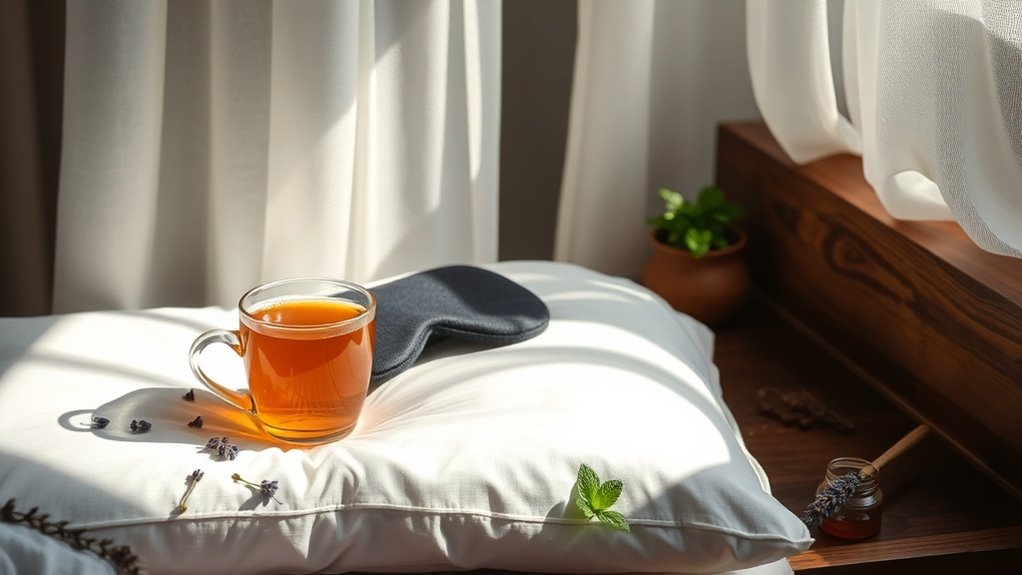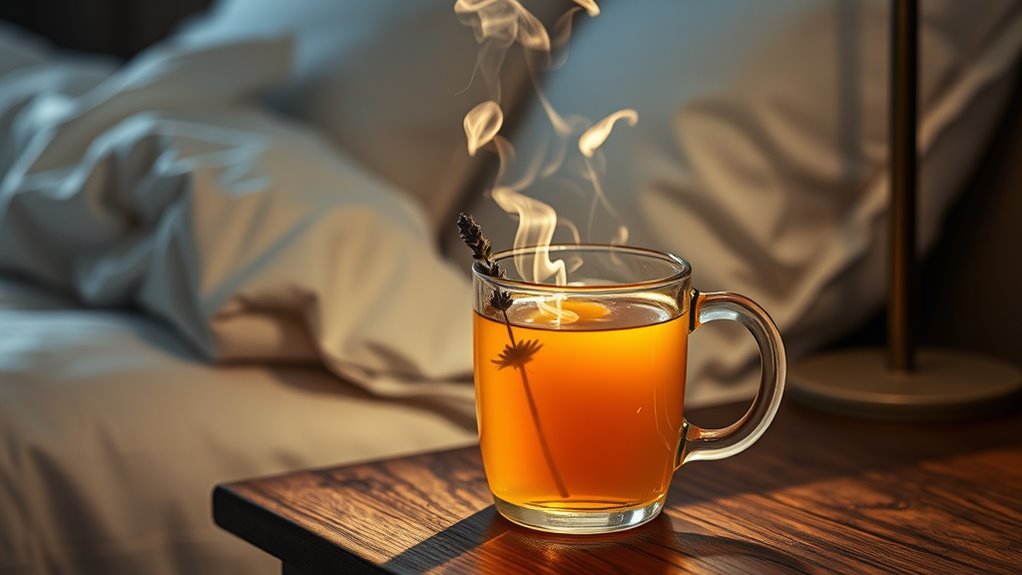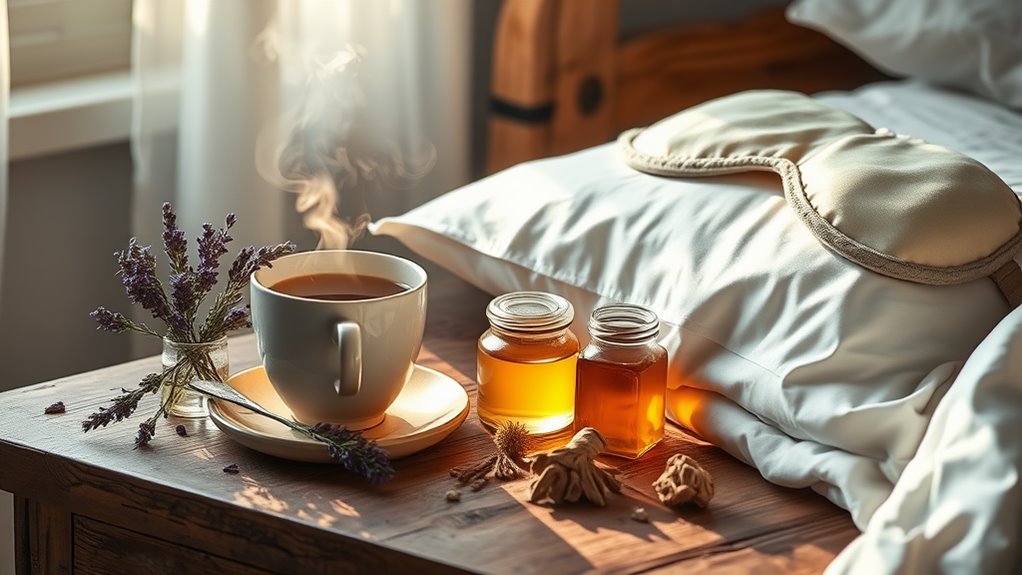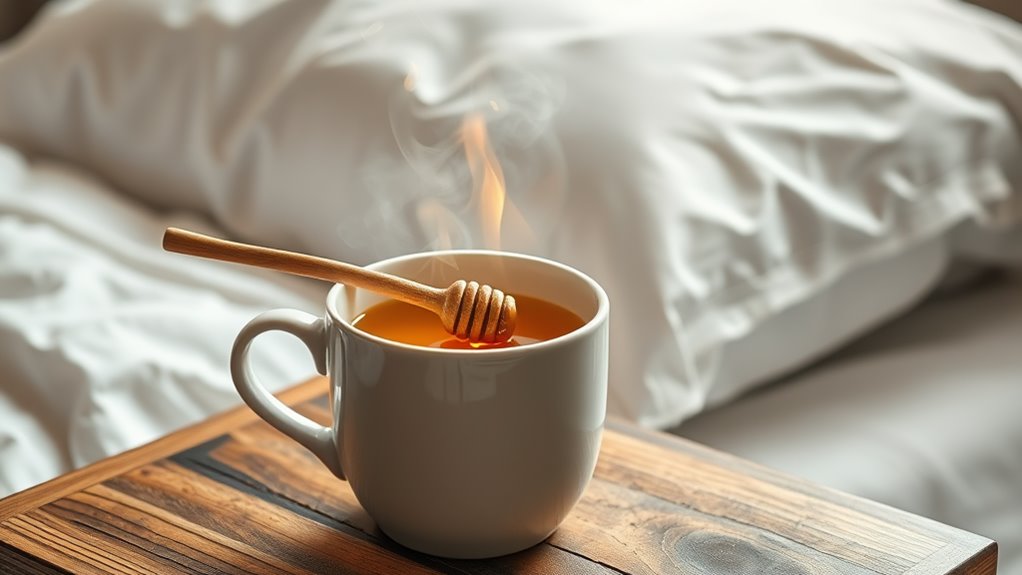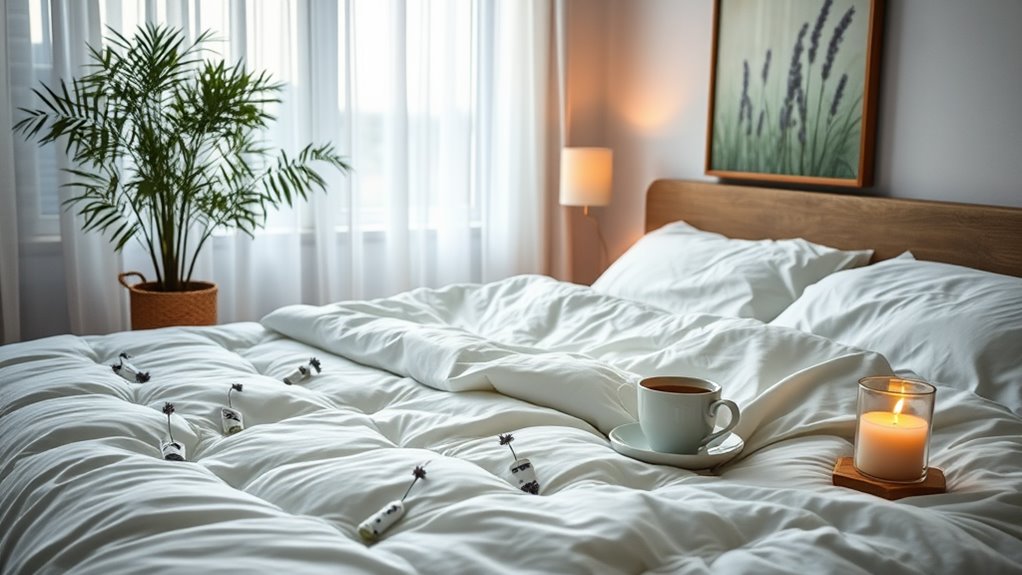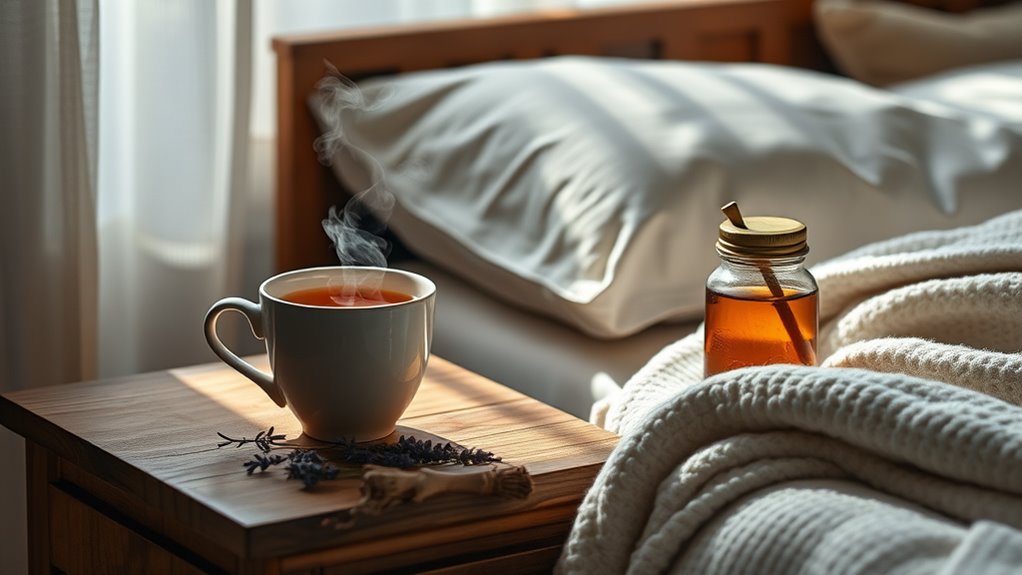Natural Sleep Remedies That Calm Your Mind and Body
You can achieve deeper, more restful sleep through evidence-based natural remedies that target both mind and body. Essential oils like lavender and chamomile interact with GABA receptors to promote relaxation, while herbal supplements including valerian root and ashwagandha help regulate sleep hormones. Combine these with mindfulness practices such as the 4-7-8 breathing technique and proper bedroom environment optimization between 60-67°F. Understanding how these remedies work with your body’s natural sleep mechanisms reveals additional strategies for optimal rest.
Understanding the Science Behind Natural Sleep
While many people struggle with sleep disorders, the biological process of natural sleep follows a predictable pattern regulated by circadian rhythms and neurotransmitters.
Your brain transitions through multiple sleep stages, from light sleep to deep sleep and REM cycles, typically lasting 90-120 minutes each.
Natural sleep remedies work by supporting these intrinsic mechanisms, often targeting the production of melatonin and GABA neurotransmitters.
You’ll achieve optimal results when these remedies align with your body’s natural sleep-wake cycle, helping restore balance to disrupted circadian rhythms and sleep architecture. Additionally, understanding the role of melatonin production can enhance the effectiveness of such remedies.
Essential Oils and Aromatherapy for Better Rest
As research continues to validate traditional practices, essential oils have emerged as a scientifically-supported intervention for sleep enhancement through aromatherapy.
You’ll find lavender most extensively studied, with clinical trials demonstrating its ability to increase slow-wave sleep patterns and decrease sleep latency.
Other evidence-based options include chamomile, valerian, and bergamot, which interact with GABA receptors to promote relaxation.
To implement aromatherapy effectively, use a diffuser in your bedroom 30 minutes before sleep, or apply diluted oils to your pulse points.
Start with 2-3 drops of essential oil per 10ml of carrier oil for optimal results.
Herbal Teas and Supplements That Promote Sleep
Many herbal remedies have demonstrated notable sedative and anxiolytic properties through clinical research.
Valerian root supplements can reduce sleep latency and improve sleep quality, while chamomile tea contains apigenin, a compound that binds to brain receptors promoting drowsiness. You’ll find passionflower extract particularly effective for anxiety-related sleep disturbances.
Ashwagandha, an adaptogenic herb, helps regulate cortisol levels and supports healthy sleep cycles. For optimal results, combine magnolia bark and lemon balm tea, as they work synergistically to enhance GABA activity in your brain. Moreover, herbs like valerian and chamomile interact with GABA receptors, which can significantly boost calming neurotransmitter production.
Start with low doses of these supplements and consult your healthcare provider, especially if you’re taking other medications.
Mindfulness and Relaxation Techniques
Since mindfulness practices target the autonomic nervous system’s stress response, they serve as powerful tools for improving sleep quality.
You’ll find progressive muscle relaxation particularly effective, as it systematically releases physical tension through sequential muscle engagement and release.
Deep breathing exercises, specifically the 4-7-8 technique, activate your parasympathetic nervous system, reducing cortisol levels and heart rate.
Body scan meditation helps identify areas of tension while promoting mental stillness.
You can also practice guided imagery by visualizing peaceful scenarios, which decreases anxiety and racing thoughts that typically interfere with sleep onset.
Creating the Perfect Sleep Environment
While mindfulness techniques help calm your mind, your physical surroundings play an equally important role in sleep quality.
Your bedroom should maintain a temperature between 60-67°F (15-19°C), with humidity levels at 30-50%.
Eliminate sources of blue light, including phones and LED displays, at least one hour before bedtime.
Install blackout curtains to block ambient light, and use white noise machines to mask disruptive sounds.
Your mattress and pillows should support proper spinal alignment, typically requiring replacement every 7-10 years and 1-2 years, respectively.
Consider using hypoallergenic bedding to minimize respiratory irritants.
Bedtime Rituals and Healthy Sleep Habits
Establishing consistent bedtime rituals signals your brain to prepare for sleep and helps regulate your circadian rhythm.
You’ll benefit from implementing a 30-60 minute wind-down routine that includes dimming lights, avoiding screens, and engaging in calming activities like reading or gentle stretching.
Set a fixed bedtime and wake time, even on weekends, to maintain your body’s natural sleep-wake cycle.
Practice proper sleep hygiene by avoiding caffeine after 2 PM, limiting alcohol consumption, and completing vigorous exercise at least 3 hours before bed.
These evidence-based habits increase your melatonin production and optimize your sleep architecture.
Nutrition and Dietary Changes for Quality Sleep
Your diet plays a crucial role in sleep quality through its influence on neurotransmitters and hormones that regulate the sleep-wake cycle.
Consume foods rich in tryptophan, such as turkey, eggs, and dairy, which your body converts to sleep-inducing serotonin. Include complex carbohydrates like whole grains to help transport tryptophan across the blood-brain barrier.
Magnesium-rich foods like leafy greens and nuts can reduce stress and promote muscle relaxation.
Avoid caffeine after 2 PM, limit alcohol consumption, and don’t eat large meals within three hours of bedtime.
These dietary modifications can significantly improve your sleep onset and duration.

